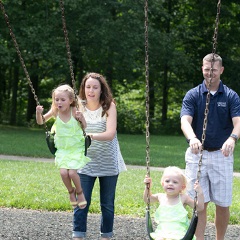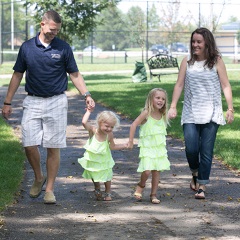Ryan's Story: Surviving One Medical Crisis – And Another
 On his 31st birthday, life was pretty good for Ryan Davis. He and his wife, Heather, were building a new house in Springboro to raise their two daughters, Avery and Hadley, both under the age of 4.
On his 31st birthday, life was pretty good for Ryan Davis. He and his wife, Heather, were building a new house in Springboro to raise their two daughters, Avery and Hadley, both under the age of 4.
And Ryan had successfully recovered from a potentially deadly episode that previous summer. When he had had chest pain mowing the lawn, a trip to the emergency department at Miami Valley Hospital South revealed his left anterior descending artery had a 95 to 99 percent blockage. A coronary stent disease was inserted to open Ryan’s artery, followed by 12 weeks of cardiac rehab.
After this he resumed his active life, including his love for running, which he shares with Heather. At the start of 2016, Ryan had much to be grateful for.
But, he says, “I had been having headaches for about a month before my birthday. I attributed that to our crazy life of being busy young parents and building a house.”
Then the head pain became intense. Ryan found he couldn’t stand up. Once again, he and Heather went to Miami Valley Hospital South.
After a CT scan, Ryan and Heather were hit with devastating news: Ryan had a brain tumors, an adult-onset medulloblastoma originating in the back part of the brain. This is the most common malignant brain tumor in children, but is rarely found in adults.
“Your world crashes when you hear a diagnosis of brain cancer,” he says. “You think of your wife, your kids, your life, and how nothing will be the same.”
Ania G. Pollack, MD, a board-certified neurological surgeon with the Clinical Neuroscience Institute, recommended surgery. In a seven-hour operation at Miami Valley Hospital, Dr. Pollock removed the 4 cm by 4 cm tumor, aided by a sophisticated system that provides a 3D view of the patient’s anatomy.
To help kill remaining cancer cells, chemotherapy and radiation were also scheduled. Ryan Steinmetz, MD, an oncology radiologist with Dayton Physician Network, used two different radiation treatments: external beam radiation therapy, the most common form of radiation, and internal radiation (brachytherapy), which implants radiation close to where the tumor had been.
Cancer consumed much of Ryan’s life in 2016 – recovery from surgery, additional testing, eight chemo sessions, 31 radiation treatments, and other therapies and medical appointments. “I had more days ‘with stuff’ than days of no appointments,” he says. “I wrestled with depression – and still do even today. But I found I had to fill my mind with positive thoughts, to keep going, to move forward.”
Ryan says he’s now a big believer in “let go and let God.” His days of being “a control freak” are over, he says with relief.
Ryan’s sense of humor remains intact. He said while chemo is hard, so is being a parent, after all. Of course, parenting while recovering from brain cancer has additional pressures.
“There were many days when Heather had to do everything for our daughters, and I couldn’t even help her get the girls dressed,” says Ryan. “I had to battle cancer while raising kids and raise kids while I was battling cancer. Anyone who has been through it knows those are two separate challenges.”
Ryan has resumed his job at the City of Kettering’s parks and recreation department.
As tribute to all who helped him – relatives, friends, neighbors, coworkers, employers – Ryan is helping other young parents who have brain cancer by founding the Gratitude and Grace Foundation.
“For other people who are going through what we did, I want to help connect them with resources they need,” he says. “I am passionate about spreading the possibility of hope in people’s lives and will take any opportunity to share what I have learned from this journey I never expected.”


Ryan Steinmetz, MD
View Profile
Contact Us
Call the Premier Health cancer hotline at (844) 316-HOPE(844) 316-4673 (4673), Monday through Friday, 8 a.m. to 5 p.m., to connect with a Premier Health cancer navigator.

